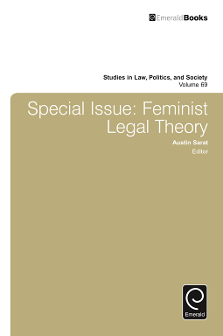Special Issue: Feminist Legal Theory: Volume 69

Table of contents
(13 chapters)Abstract
This paper explores four works of contemporary fiction to illuminate formal and informal regulation of sex. The paper’s co-authors frame analysis with the story of their creation of a transdisciplinary course, entitled “Regulating Sex: Historical and Cultural Encounters,” in which students mined literature for social critique, became immersed in the study of law and its limits, and developed increased sensitivity to power, its uses, and abuses. The paper demonstrates the value theoretically and pedagogically of third-wave feminisms, wild zones, and contact zones as analytic constructs and contends that including sex and sexualities in conversations transforms personal experience, education, society, and culture, including law.
Abstract
This paper evaluates the modern baseline presumption of nonconsent in sexual assault (rape) cases in light of different theories of sexuality (feminism on the one hand and sex positivism/queer theory on the other) and in light of how sexuality manifests itself in the lives of contemporary young women. The authors analyze social science literature on contemporary heterosexual practices such as sexting and hook-ups, as well as contemporary media imagery, to inform a contemporary understanding of the ways in which young people perceive and experience sex. Using this evidence as a foundation, the authors reconsider the ongoing utility of a baseline presumption of nonconsent in sexual assault cases. This paper demonstrates the complex relationship between women’s sexual autonomy, the contemporary culture’s encouragement of women’s celebration of their own sexual objectification and the persistence of high rates of unwanted sex. In the end, it demonstrates why a legal presumption against consent may neither reduce the rate of nonconsensual sex, nor raise the rate of reported rapes. At the same time, it shows how the presumption itself is unlikely to generate harmful consequences: if it deters anything, it likely deters unwanted sex, whether consented to or not.
Abstract
From the mid-1980s to the mid-1990s, several prominent feminist legal scholars made a case for “difference feminism.” Inspired by psychologist Carol Gilligan’s classic text, In a Different Voice, these scholars argued that social relationships, caring, and the emotions should be recognized as important to jurisprudence and legal regulation. Today, difference feminism is no longer a dominant movement within legal scholarship, but reformers are bringing “mindfulness,” “emotional intelligence,” and attention to relationships into law and business – a development dubbed “therapy culture” by its critics. This essay describes some of the manifestations of therapy culture in law and argues for more feminist engagement.
Abstract
This paper poses the question of whether the mainstream feminist movement in the United States, in concentrating its efforts on achieving gender parity in the existing workplace, is selling women short. In it, I argue that contemporary U.S. feminism has not adequately theorized the problems with the relatively unregulated market system in the United States. That failure has contributed to a situation in which women’s participation in the labor market is mistakenly equated with liberation, and in which other far-ranging effects of the market system on women’s lives inside and outside of work – many of them negative – are overlooked. To theorize the effects of the market system on women’s lives in a more nuanced manner, I borrow from the insights of earlier Marxist and socialist feminists. I then use this more nuanced perspective to outline an agenda for feminism, which I call “market-cautious feminism,” that seeks to regulate the market to serve women’s interests.
Abstract
This paper explores the relationship between feminist theory and rising economic inequality. It shows how greater inequality reflects the valorization of the stereotypically male qualities of competition and hierarchy, producing a greater concentration of wealth among a small number of men at the top, shortchanging men more than women through the rest of the economy, and altering the way that men and women match up to each other in the creation of families. By creating a framework for further research on the relationship between the norms of the top and the disadvantages of everyone else in more unequal societies, the paper provides a basis for feminists to develop a new theory of social power.
The paper demonstrates how the development of winner-take-all income hierarchies, the political devaluation of families and communities, and the terms of the family values debate diminish equality and community. The paper addresses how to understand these developments as they affect both the structure of society and the allocation of power within our families in ways that link to the historic concerns of feminist theory. It accordingly ends by asking the “woman question” in a new way: one that revisits the stereotypically masculine and feminine and asks how they connect to hierarchy, one that considers whether the inclusion of women changes institutional cultures in predictable ways, and one that wonders whether the values that today are associated with more women than men offer a basis for the reconstruction of society more generally.
Abstract
Derek Parfit’s non-identity problem calls into question the claims of both the state and individuals when they purport to act for the benefit of future children. This paper discusses how adoption of the non-identity argument as a legal argument could affect reproductive and family policy, demonstrating that it undermines the child-centric approach to assigning legal parentage. The paper concludes, however, that these non-identity problems can be solved by the expected value approach, which demonstrates that efforts to benefit future people can be logically coherent even if those efforts also affect the genetic identities of the future people.

- DOI
- 10.1108/S1059-4337201669
- Publication date
- 2016-02-08
- Book series
- Studies in Law, Politics, and Society
- Editor
- Series copyright holder
- Emerald Publishing Limited
- ISBN
- 978-1-78560-783-7
- eISBN
- 978-1-78560-782-0
- Book series ISSN
- 1059-4337